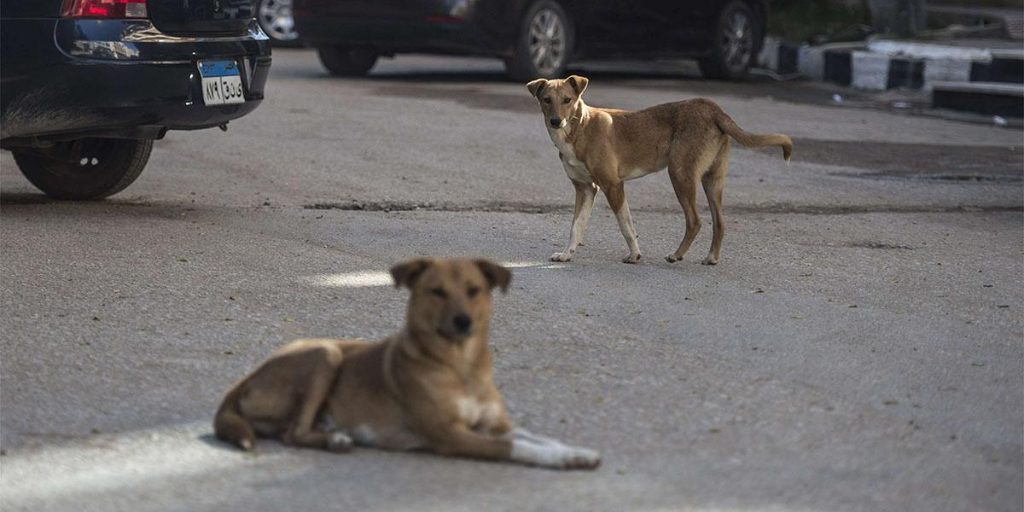Egypt has a stray animal population problem – with the canine population estimated to be at 15 million, and though there is no data on the feline population, it can be inferred to be the same, if not more. Consequently, Egypt currently lacks an efficient system to regulate this astounding number of animals, often spotted roaming residential areas and rummaging through public waste in packs.
Three years ago, the Egyptian Parliament recommended the creation of a committee to solve the issue of their proliferation. Yet, no steps forward in that matter have been taken so far.
Many activists and citizens believe that Egypt’s stray animal problem urgently needs a humane solution, as in the past, solutions often involved poisoning, hurting, or capturing strays without a long-term plan. Recently, in December 2021, 30 stray dogs were found poisoned near the Canadian International College, sparking a social media outcry for better animal rights.
Currently, Article 45 of the Egyptian Constitution commits to “the prevention of cruelty to animals.” Beyond that code of law, the government has yet to introduce an independent Animal Welfare Act to better regulate and protect Egypt’s stray populations.
A political initiative named Share’ Aleef (A Tame Street) plans to fix Egypt’s animal rights gap. They plan to do that by showing that it is everyone’s problem.
Share’ Aleef’s Plans To Change That
What most Egyptians know of animal rights are shelters and NGOs. Shelters are far and few, helping primarily in rescuing and caring for strays or abandoned animals. However, no political initiative has been taken to create tangible, legal changes.
Share’ Aleef plans to fill that legislative gap.
Zeina Essam, the founder of the initiative, along with her colleagues Mohammed Ezzat and Hussein Hareedy, spoke to Egyptian Streets about the initiative’s inception.
The political initiative is predominantly run through on-ground activities, governmental and non-governmental. Digitally, they spread their cause through their social media platforms.
“I used to get distraught when I’d see any animal being abused, poisoned, or killed,” said Essam. “They don’t deserve that. No being does. So, when I conducted surveys and started really digging as to why this happened, I realized it mainly has to do with the pre-existing misperceptions of people about animals. Like, how people think any dog has rabies, or, how any cat is aggressive. Ideas that really have no evidence behind them.”
“For the past two or three years, there has been an increasing demand for animal rights laws, although there hadn’t been ones that took practical and legal steps of lobbying for it prior to us,” Essam mentions.
Animal Rights Equals Environmental Rights
Essam, who works as an aide to Abdelmoneim Emam, Member of Parliament (MP) and President of the Justice Party, shared with Egyptian Streets that when she proposed the idea of Share’ Aleef to Emam, he made it clear that animal rights in and of itself are not enough to change the everyday Egyptian mindset on animals.
Instead, Emam proposed that Egypt’s society needed to understand that animal rights directly affect its well-being, environment, and the country’s sustainable development goals (SDGs).
This is otherwise known as an ecological triangle, linking animal rights directly with impacts on the environment and society.
“[Animal rights] is about acknowledging an ecological triangle that affects us as humans. For example, animal rights is not just about treating animals kindly. It’s about the chemicals we use in the environment that harm animals. When we use poisonous and costly chemicals in our soils that are left on worms, which are a threat to crops, the birds that eat worms could suffer from poisoning, causing a decrease in the species and an increase in worms that damage crop yields,” Hareedy explained.
In other words, through MP Emam’s recommendations, the initiative became much larger than just preventing stray killings or changing the culture of strays. It addressed how the mistreatment of animals, misuse of chemicals, and lack of awareness by a large portion of Egyptian society became detrimental to the environment – in return, disbenefiting the society.
By compelling the Egyptian society and government to recognize that animal rights have a significant effect on the environment, they will be driven to care for animal rights.
“As a country that is entering a period of prioritizing SDGs, this is one of the core challenges we need to face,” said Ezzat.
All that is left is to draft laws for the government to consider, which Essam, Hareedy, and Ezzat already have undertaken.
The Only Real Change is a Legal Change
Under the auspices of Emam, Share’ Aleef’s team helped draft a set of animal welfare laws that were presented by the MP himself during a parliamentary session.
The draft laws, which have already passed the necessary 60 parliamentary votes to be discussed, are currently being considered by the House of Representatives. They are all-encompassing, tackling a variety of articles from farm animals, to lab animals, to environmentally-related laws, and even animal-related businesses.
For example, the initiative dedicates Chapter Six of its draft to lab tests on animals. Article 35 in the chapter prohibits “scientific experiments on animals unless by recognized scientific research bodies and appropriate institutions and within a humane scope of testing specified by law.”
More significantly, the proposed laws highlight the need for strict punishments for those who violate one or more of the draft’s 19 penal articles.
The current Egyptian Penal Code enforces fines of up to 200 Egyptian Pounds (10 US Dollars) and imprisonment up to seven years through articles 355 and 357, depending on the context of the crime.
Share’ Aleef’s draft dedicates Chapter 10 entirely to its penal articles in tandem with its civil article. For example, Article 74 of the draft enforces a minimum punishment of one year in prison and EGP 50,000 (USD 2,730) for those who have murdered an animal, be it a pet or stray.
What’s next for Share’ Aleef
Besides continuously lobbying for their proposed animal welfare laws, the initiative is proceeding with a multistakeholder approach to include all the relevant governmental actors.
“We studied dimensions economically, politically, societally, and religiously – even artistically; how it affects our culture and the foreign perception on our SDGs,” said Essam.
That notion was epitomized in the initiative’s launch conference on 19 March.
View this post on Instagram
According to Ezzat, “the whole point of it was to formally announce to all the relevant parties of our initiative and our plans. It involved representatives and panelists from the Ministries of Environment, Planning, Culture, Agriculture, Youth and Sports, Al Azhar, and the Orthodox Church.”
“Next up, we hope to create a central organization under the umbrella of a certain governmental body in order to proceed with on-ground steps,” Hareedy added.
In an era of wartime instability and economic crises, many Egyptians could automatically label the initiative as inconvenient and ill-timed.
However, some could argue there will never be a “perfect time” to introduce animal welfare laws.
As Ezzat puts it, “There’s the stereotypical line of “you’re going to ignore struggling people and tell us about animals?” and yes we will. Because this directly affects our ecosystem, it affects us all. It means a lot to me, to Zeina, and to Hussein. And I hope we can help make it matter to everyone.”






Comment (1)
[…] شارك “أليف: حل منهجي لمشكلة حقوق الحيوان في مصر […]